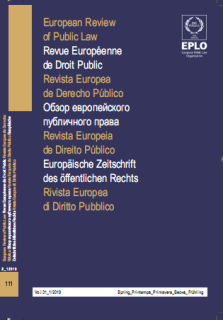
The Constitutional Impact of National Referendums
and the UK’s Secession from the EU
David Feldman is Professor Emeritus of English Law in the University of Cambridge.
Veronika Fikfak is Senior Lecturer in Law of Homerton College, Cambridge
To understand the use and significance of referendums (and especially the EU withdrawal referendum in 2016) in the constitution, they must be set in the context of developments in the constitution more generally. In particular, we need to consider: (1) challenges to the notion of parliamentary sovereignty posed by the EU alongside problems flowing from devolution to Scotland, Wales and Northern Ireland, and the role of referendums in legitimating restrictions on the power of the UK’s Parliament; (2) challenges to parliamentary sovereignty posed by referendums themselves, particularly but not exclusively in the context of the UK’s withdrawal from the EU; (3) the conflict between the royal prerogative to conduct foreign affairs and make treaties and parliamentary authority, and challenges to popular and political acceptance of the independence of the judiciary posed by judges’ efforts to maintain constitutional legality in the face of the result of the withdrawal referendum; and (4) the overall effect of all this on the reality, rather than rhetoric, of the UK’s ‘taking back control’ of its own af-fairs through withdrawing from the EU. This report examines these issues in turn.
Pour comprendre l’utilisation et l’importance des référendums (et en particulier le référendum sur la sortie de l’UE en 2016) dans la Constitution, il faut les situer dans le contexte de l’évolution générale de la Constitution. En particulier, il convient de considérer: 1) les contestations de la notion de souveraineté parlementaire posées par l’UE parallèlement aux problèmes découlant de la décentralisation pour l’Ecosse, le Pays de Galles et l’Irlande du Nord, et le rôle des référendums pour légitimer les restrictions au pouvoir du Parlement britannique; 2) les contestations de la souveraineté parlementaire posées par les référendums eux-mêmes, notamment mais pas exclusivement dans le contexte du retrait du Royaume-Uni de l’UE; 3) le conflit entre la prérogative royale de conduire les affaires étrangères et de conclure des traités et l’autorité parlementaire, et les contestations de l’acceptation populaire et politique de l’indépendance du pouvoir judiciaire que posent les efforts des juges pour maintenir la légalité constitutionnelle face au résultat du référendum de retrait; 4) l’effet global de tout cela sur la réalité, plutôt que sur la rhétorique, de la prise en main par le Royaume-Uni de ses propres affaires en se retirant de l’UE. Le présent rapport examine ces questions à tour de rôle.
* We are grateful to Professor Gordon Anthony and participants in the 2018 Reunion of the European Group of Public Law for illuminating comments and information. Remaining errors and omissions are our own responsibility.
This article has been written over a period of deep uncertainty over the outcome of the withdrawal process, and submitted (in December 2018) at a time when uncertainty was, if anything, even more intense than previously. We assumed that the withdrawal agreement negotiated between the EU and the UK would come into operation on ‘exit day’, i.e. 29 March 2019 at 11.00 p.m. GMT, but by the time the article was in proof (May 2019) the deadline had already been extended twice. We have tried to bring the text up to date to 5 May 2019, but great uncertainty remains.





















